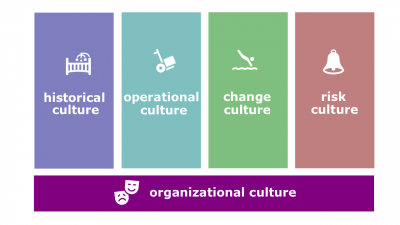Difference between revisions of "Organizational culture"
(Created page with "400px|thumb|right|[[Organizational culture]]Organizational culture (hereinafter, the ''Culture'') is a system of the shared meaning, va...") |
|||
| Line 1: | Line 1: | ||
| − | [[File:Organizational-culture.png|400px|thumb|right|[[Organizational culture]]]][[Organizational culture]] (hereinafter, the ''Culture'') is a system of the shared meaning, values, principles, traditions, and ways of doing things held by members of the [[organization]] that influence the way organizational members act and that distinguish the organization from other organizations. Every [[organizational culture]] can be divided in four parts: (1) [[historical organizational culture]] or the culture envisioned by the founders and others that is no longer executed, (2) [[operational culture]] or the culture exercised by an enterprise today for its [[operations]], (3) [[change culture]] or the culture related to change in the enterprise, and (4) [[risk culture]] or the culture related to handling risks. | + | [[File:Organizational-culture.png|400px|thumb|right|[[Organizational culture]]]][[Organizational culture]] (hereinafter, the ''Culture'') is a system of the shared meaning, values, principles, traditions, and ways of doing things held by members of the [[organization]] that influence the way organizational members act and that distinguish the organization from other organizations. |
| + | |||
| + | ==Parts== | ||
| + | Every [[organizational culture]] can be divided in four parts: (1) [[historical organizational culture]] or the culture envisioned by the founders and others that is no longer executed, (2) [[operational culture]] or the culture exercised by an enterprise today for its [[operations]], (3) [[change culture]] or the culture related to change in the enterprise, and (4) [[risk culture]] or the culture related to handling risks. | ||
==Related concepts== | ==Related concepts== | ||
Revision as of 10:35, 22 November 2018
Organizational culture (hereinafter, the Culture) is a system of the shared meaning, values, principles, traditions, and ways of doing things held by members of the organization that influence the way organizational members act and that distinguish the organization from other organizations.
Parts
Every organizational culture can be divided in four parts: (1) historical organizational culture or the culture envisioned by the founders and others that is no longer executed, (2) operational culture or the culture exercised by an enterprise today for its operations, (3) change culture or the culture related to change in the enterprise, and (4) risk culture or the culture related to handling risks.
Related concepts
- Strong organizational culture. An organizational culture in which the key values are intensely held and widely shared.
- Positive organizational culture. An organizational culture that emphasizes building on employee strengths, rewards more than punishes, and emphasizes individual vitality and growth.
- Organizational subculture. A miniculture within an organization, typically defined by department designations and geographical separation.
